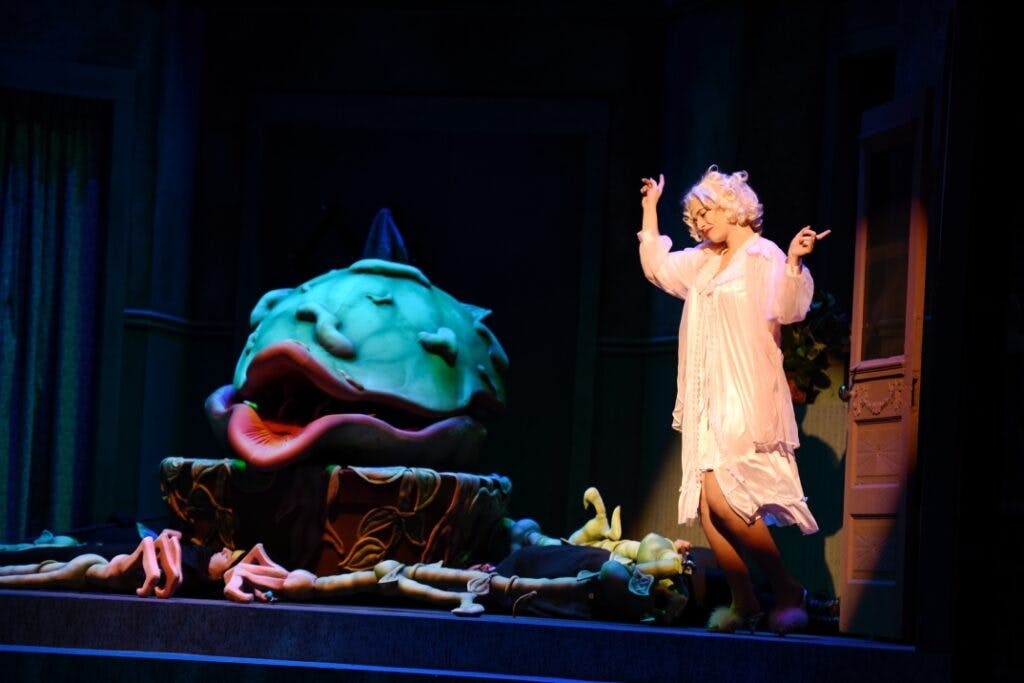Keni Brown's Senior Thesis Finds 1950s Horror-Spoof Challenging Audience's Values and Ethics
Mackenzie “Keni” Brown felt the impact of starring in Wilmington College Theatre’s production of Little Shop of Horrors last fall long after the show’s final curtain fell.
Brown, a May 2019 graduate in English/communication arts from Xenia, became intrigued with how the satirical elements she found in the 1950s horror-spoof can be applied in modern society — to unbridled consumerism, environmental degradation and the intersection between science and politics.
PICTURED: Senior Keni Brown portrays Audrey in WC Theatre's production of Little Shop of Horrors last fall. Her award-winning senior research finds symbolism in the blood-thirsty, man-eating plant, Audrey Two.
Her research resulted in the award-winning senior thesis, “Capitalism’s Little Shop of Horrors: Human Desires and Their Eco-critical Consequences in Climate-Fiction Satire,” which she presented at the Butler University Undergraduate Research Conference this spring.
Her work also won a “Best in Class” award at WC’s Student/Faculty Research Forum and first place in the College’s Cliff Hardie English Essay Awards (Upper Division).
“I have loved being able to meld everything that I am most fervently passionate about — literature, theatre and saving our environment — into a political call to action through this research,” Brown said.
You’ll recall, the storyline in Little Shop of Horrors finds the meek, floral assistant, Seymour Krelborn, stumbling across a new breed of plant he names Audrey Two, after his coworker crush, Audrey — Brown’s character. The big-mouthed, R&B singing carnivore promises unending fame and fortune to the down-and-out Krelborn as long as he keeps feeding it — blood.
“Little Shop challenges audiences’ ethics and values by focusing on caricatures of human desire as metaphors for working class America that governmentality — or specifically the bio-political manipulation spread through corporations from the government itself — exploits through marketing and brand culture,” Brown said.
Through the “lens” of the musical, she sees bio-politics as perpetuating the so-called Capitalocene, the concept connecting capitalism with manmade climate change and other acts of environmental distress that are quickly bringing on a new epoch in Earth’s history.
“Nature itself then adapts to this threat and imitates the same bio-political methods of sovereignty, government management and discipline that the Capitalocene utilizes,” she said in alluding to the emergence of Audrey Two.
Indeed, the man-eating plant is a symbolic manifestation of this.
“Audrey Two, a supernatural plant that evolves its plant bio-semiotics into human semiotics and spoken language through the deliberate absurdity of drinking human blood, is the symbol of vengeful bio-power sent forth to reclaim the planet’s environment from the parasitic Capitalocene,” she added.
According to Brown, this dynamic reveals the musical as a hidden work of satirical merit with bio-political relevance.
“Little Shop of Horrors also represents a new step forward for eco-critics in determining what qualifies as canon within environmentally themed fiction writing,” she said.
Brown, a mainstay with WC Theatre for four years, was active in the Honors Program for both English and communication arts. She graduated cum laude as a member of Green Key Honor Society and Omicron Delta Kappa, the national leadership honor society.
